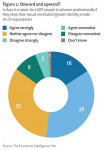Recessions favour the bold, says new Economist Intelligence Unit report
The usual recommendations for surviving a recession include tightening receivables, reducing inventory, cutting discretionary costs and selling non-core assets to raise additional cash. However, a recession offers an opportunity to shake things up and make more fundamental changes. Technology companies are particularly good at scene-shifting adjustments during tough economic times. Intel, Apple and Nokia have all successfully adapted their business models in past recessions.
For companies with a strong balance sheet, a recession is also a great time to invest in people, information technology and research & development. “In a recession, business people are often so focussed on surviving the next quarter that they forget to prepare for the inevitable upturn,” says Robin Bew, Editorial Director and Chief Economist at the Economist Intelligence Unit. “A company with a strong team and a pipeline of new products or services is going to be in a winning position when the recession finally bottoms out. For the rest, playing catch-up when resources are once again scarce and expensive is going to put a significant drag on recovery.”
Other key findings of the report include:
·Business models: As traditional sources of revenue dry up, recessions often prompt companies to rethink their business model. A survey of senior executives, conducted by the Economist Intelligence Unit found that 25% of companies have changed their business model as a result of the financial crisis and a further 24% aim to do so in the near future.
·Talent: Before the financial crisis took hold, senior executives cited the global war for talent as one of the main constraints on business growth, especially in emerging markets. Now most companies are focusing on lay-offs—hoping to cut just the fat, but in some cases also losing the talent that was built up at great cost over the past few years. When the recession bottoms out, the war for talent will pick up where it left off, and those companies that nurtured talent in the downturn will be in a more advantageous position when business improves.
·New markets: When a firm’s traditional markets dry up, it needs to go in search of new ones. In a global economy, those markets could be anywhere and, at the moment, India and China are looking the most buoyant. But new markets don’t have to be on the other side of the world. Companies should consider selling to substitute markets closer to home. So, a bank that caters to high net worth individuals might consider offering services to middle-income customers.
웹사이트: http://www.eiu.com
연락처
Joanne McKenna
Press Liaison
Economist Intelligence Unit
26 Red Lion Square
London
WC1R 4HQ
UK
Direct: +44 (0) 20 7576 8188
Sales: +44 (0) 20 7576 8181
Switchboard: +44 (0) 20 7576 8000
email: 이메일 보내기
이 보도자료는 Economist Intelligence Unit가(이) 작성해 뉴스와이어 서비스를 통해 배포한 뉴스입니다. 뉴스와이어는 편집 가이드라인을 준수합니다.




